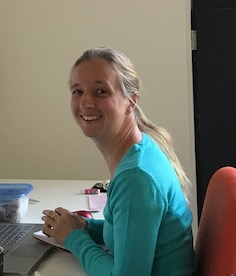Principal Investigator
Leslie M. Turner
download CV - Google Scholar - ResearchGate
email: l.m.turner [at] bath.ac.uk
twitter: @DrLMTurner
I received an AB in Biology from Barnard College and a Master's in Biological Anthropology and Anatomy from Duke University. I completed my PhD in 2007 with Hopi Hoekstra at UC San Diego. My dissertation research focused on the evolution of egg and sperm proteins in deer mice (genus Peromyscus). I moved to Harvard with the Hoekstra lab for a brief postdoc investigating the evolution of monogamy in Peromyscus. I began my postdoctoral work on hybrid sterility in house mice (Mus musculus) at the Max Planck Institute for Evolutionary Biology, then in Bret Payseur’s laboratory at the University of Wisconsin - Madison. I returned to the Max Planck Institute for Evolutionary Biology as a Visiting Researcher 2013-2016, to develop wild-derived recombinant inbred mouse strains for research on the genomics of reproductive isolation. In 2016, I became a Lecturer (i.e. Asst. Professor) at the University of Bath, in the Milner Centre for Evolution, and the Department of Biology and Biochemistry.
Postdocs
Katy Morgan
email: k.j.morgan [at] bath.ac.uk
I completed my PhD in Catherine Walton's lab at the University of Manchester in 2009. My thesis focused on the roles of historical climate change and ecological heterogeneity in driving population divergence and speciation within Southeast Asian Anopheles mosquitoes. I then joined Ralf Sommer's research group at the Max Planck Institute, Tubingen, to work as a postdoc on the population genetics and genomics of island nematodes. Continuing in the field of population genomics, I moved to the University of New Orleans to complete a postdoc with Nicola Anthony. By combining population genomic with geospatial modeling and morphometric techniques, I characterised patterns of adaptive variation across Central Africa in two mammal species, the soft furred mouse Praomys misonnei and the blue duiker Philantomba monticola. I also identified areas of high genomic vulnerability, in which populations will have the greatest challenges to respond to future environmental change, so providing useful information for conservation prioritisation efforts. I joined Leslie Turner's research group in July 2018, and will be working on the disruptions in gene regulatory networks driving male sterility in hybrid house mice.
PhD Students
Paigan J. Aspinall
email: p.j.aspinall [at] bath.ac.uk
twitter: @paiganaspinall
I graduated from the University of Oxford with an integrated masters in Biochemistry (Molecular and Cellular) in 2017. Directly after I started my PhD in the Turner lab at the University of Bath, where I am investigating hybrid male sterility in the house mouse.
Currently I am working on two projects. The first involves the characterisation and mapping of fertility defects found in wild-derived hybrid crosses – roughly 500 of these mice have been phenotyped and the phenotyping has involved both gross traits (eg. Testis weight, sperm count etc.) as well as the quantification of more precise defects (eg. Vacuolation, levels of apoptosis). The goal is to increase the accuracy from previous mapping work in order to produce high resolution mapping results. The second project I am working on is producing a time course of spermatogenesis in several congenic mouse lines (PWD backgrounds with sterility candidate regions from domesticus mice). I am performing fine-scale phenotyping on these congenic lines at different time points from the onset of meiosis (~10 days) through to and past sexual maturity. This will allow us to identify the exact timings of where spermatogenesis is being disrupted in hybrid males, thus facilitating the identification of hybrid male sterility candidate genes.
Lab Alumni
Andrea Bours, Masters student 2018
Andrea got a Masters in Evolution and Population Biology at the University of Bath. She investigated morphological variation in the baculum hybrid mice. She is now an IMPRS PhD student working on the evolution of bird migration in Miriam Liedvogel’s Behavioural Genomics at the Max Planck Institute for Evolutionary Biology.
You?
I am always happy to hear from prospective postgrads and postdocs interested in my ongoing projects or related questions!




